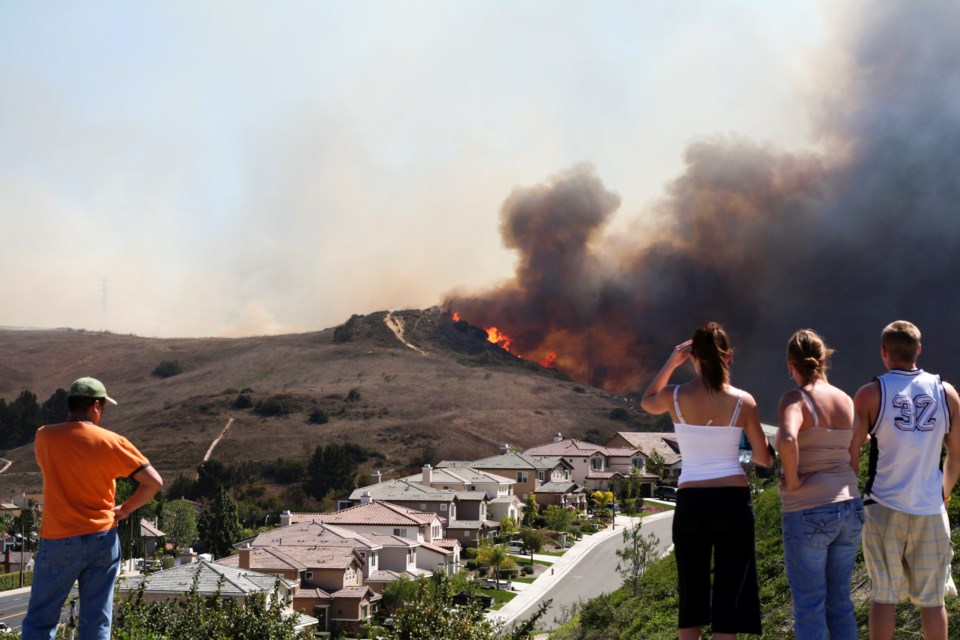As the predicted impacts of climate change become a reality in the form of extreme weather-related disasters, the true costs to our cities and towns come sharply into focus. Communities are on the front lines of absorbing the social, environmental and financial costs of weather-related events, such as floods, wildfires, droughts, and coastal erosion.
The anticipated economic impacts—locally, provincially and nationally—have insurance companies and governments scrambling to calculate the projected costs of climate-related events over the coming decades and to develop contingency plans that mitigate the risks.
The Government of Canada’s Evaluation of the Disaster Financial Assistance Arrangements Report (2016–2017) found that costs of natural disasters, particularly flooding, have increased from an average of $291 million (1995–2004) to $410 million per year (2005–2014), and they’re expected to rise to $900 million per year as the number, frequency, and severity of extreme weather events across the country increase. Reported insurance losses by the Insurance Bureau of Canada have soared from a yearly average of $405 million (1983–2008) to $1.8 billion over the last decade (2009–2017).
The Emergency Management Strategy for Canada (2019) asserts that the most effective way to ease the costs is through preventative actions, estimating that every $1 invested in hazard mitigation measures (e.g. dykes, building codes, land-use planning) results in an estimated savings of $6. However, implementing climate mitigation and adaptation policies, which would involve significant upgrades to pubic infrastructure, remains a challenge for communities, particularly those with a small tax base.
Several BC communities have already experienced firsthand how natural disasters can burden a local economy. Following the catastrophic flooding in May 2018 in Grand Forks, BC, an economic assessment by the Grand Forks Economic Disaster Recovery Program evaluated 125 affected businesses (23 per cent of which remained closed at the time of the report). They found that the total measurable economic losses to the local business community were upwards of $38 million, but the report noted that the actual cost was likely much higher.
BC’s 2017 wildfires cost the province over $568 million—but such sweeping cost estimates conceal the fallout for those BC residents and business owners who suffered on-the-ground losses. A report commissioned by the Thompson Nicola Regional District on the impact of the wildfires estimated that the direct economic costs of the disaster to the region were approximately $31 million, due to loss of sales for businesses and lost hours for employees. The numbers represent livelihoods that were impacted through displacement, forced closures, and tourist cancellations.
Meanwhile, five of the top 10 companies on Fortune’s Global 500 list for 2018 were oil and gas producers. Their combined profits last year alone were $1.45 trillion dollars. As these companies reap the enormous benefits of fossil fuel products, which are also a major source of greenhouse gas pollution, it leads to a fundamental question: should there be a legal, financial, and moral responsibility for fossil fuel companies to pay a share of the cost of climate change impacts?
West Coast Environmental Law (WCEL), along with 60 other BC-based organizations, are encouraging communities to address this question by demanding accountability from the fossil fuel industry. More than 55 BC municipalities, including City of Victoria, District of West Vancouver, qathet Regional District and the City of Powell River, have sent Climate Accountability Letters to global fossil fuel companies. The letters outline the financial burden that climate impacts place on taxpayers and request that the industry prepare to pay their fair share of costs. WCEL states that this action demands accountability from fossil fuel companies, sets the stage for a class action lawsuit seeking compensation for climate costs, and sets communities on the path of evaluating and preparing for climate impacts.
These are important issues for BC communities to grapple with as we begin to experience the very real costs of climate change. How will small communities pay for the infrastructure upgrades required for adaptation and mitigation, and for rebuilding when natural disasters do occur? Who will pick up the bill?
You can learn more about these issues in a series of three upcoming events titled Climate Action in Powell River’s Hands: Conversations on Local Climate Actions and Climate Law.
Event 1: Andrew Gage at Brooks Secondary School, 1:10 to 2:10 pm, Friday, February 8, Max Cameron Theatre.
Event 2: Panel Discussion on Climate Action and Climate Law, 6 to 9 pm (potluck 5:45 pm, panel discussion 7 pm), Friday, February 8, Trinity Hall, United Church.
Event 3: Andrew Gage: Legal Implications of Large-scale Emitters and Climate Change, 2 - 4 pm Saturday, February 9, Elm Room, Powell River Recreation Complex.
Andrea Hedley is a member of Climate Action Powell River Society, a non-profit organization committed to helping the residents and businesses of Powell River reduce their greenhouse gas emissions. She recently completed her master’s thesis at Royal Roads University on Social Mobilization for Climate Action.



